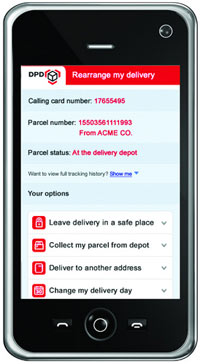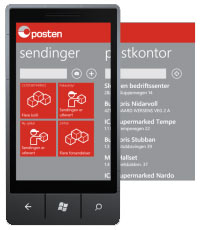
Parcel delivery firms improve mobile tracking capabilities
No state-of-the-art parcel service appears complete these days without allowing customers to track their packages via mobile phone. This week has seen a number of public and private sector package delivery specialists unveiling their latest innovations in this area.
Among the mobile facilities being developed are mobile versions of websites that are optimised for smartphones, separate applications (apps) for downloading onto smartphones, and services that offer mobile alerts that packages have arrived locally.
Mobile sites

DPD UK customers can now track parcels and rearrange delivery from their mobile website
DPD UK has become one of the latest to launch a new mobile website, allowing its customers to track their packages from their smartphones and even re-arrange delivery, claiming its mobile website is a first for a UK national carrier.
The company said research suggests a dramatic increase in consumers accessing the internet through mobile devices, with figures for the UK alone stating that 17.6m people used phones to access the internet in the last year, up from 8.5m in 2009.
“More than 15% of our customers already access our website via their mobile phones, and this number is increasing monthly,” said Dwain McDonald, chief executive at DPD.
“Having created a reputation for innovation through our unrivalled Predict service, which provides customers with a one-hour delivery window for their parcel, we are keen to maintain the momentum as a market leader.”
Outside the UK, DPD UK’s sister companies are offering similar mobile offerings – DPD Austria launched a mobile site last month. UPS recently extended mobile access to its tracking systems to 35 more countries around the world, including its major markets in Europe, Latin America and Asia.
Apps

Norway Post has extended its app to Windows-based phones
Applications are another way to engage with smartphone users, and among others this year launching parcel tracking apps have been Canada’s Purolator, TNT Express and Korea Express.
Operators that already have mobile applications have been working this year to upgrade their apps with more features, or for more mobile platforms. The US Postal Service, for example, extended its app to Android phones earlier this year, after launching for iPhones in 2009. This summer it passed the million mark for app downloads.
Yesterday, Norway Post launched its new tracking application for smartphones that use the Windows 7.5 operating system, having previously launched apps for iPhones and Androids.
“Tracking is the most used service offered on the internet, and we see that more and more people use their phones to track packages,” said Jorn Michalsen, head of information at Posten Norge. “These upgrades and custom mobile tracking pages allow us to offer our customers a good tracking experience on any mobile phone.”
Alerts
Another increasingly popular use of mobile technology in parcel tracking has been to provide a more pro-active alert service, to let consumers know their parcels have arrived with a text message or email.
Latvian Post launched a mobile alert system this week for e-commerce shipments from German mail order company Otto and its Bon Prix retail brand, with expectations that other cross-border e-retailers will join.
Raymond Ozolins, commercial director at Latvian Post, said: “The E-call system is one step the Latvian postal service is making to improve accessibility for customers, since it is more convenient to obtain information in electronic format. It is also a more efficient use of Latvian Post resources than delivering paper-based notifications.”
Elsewhere, Austria Post launched a trial for mobile alert services last month.
One potential issue of concern that Australia Post flagged up earlier this week was the fraudulent use or invention of a parcel alert service.
Australia Post, which incidentally launched its own iPhone apps last year, said fraudsters are currently perpetrating a scam in which they call consumers claiming a parcel could not be delivered, asking for money to arrange a redelivery.
“The scammer may present themselves as an employee of Australia Post or a staff member from one of our retail outlets,” Australia Post warned the public, before stating firmly: “Australia Post will never call customers to request payment for an undeliverable mail item.”










